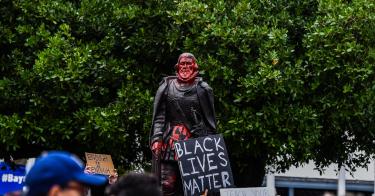First, they vandalized the language of Cervantes: changing the “o” in “Latino” to an “x,” to give us “Latinx.”
Now, these self-appointed social justice warriors are defacing statutes that mark Spain’s centuries-long settlement of Florida and the Southwest. Animating both progressive assaults is an ideological political agenda.
A few days ago, mobs of activists vandalized two statues of Juan de Onate in New Mexico, one in Albuquerque, the other in Alcalde. Spineless local leaders in Alcalde have now taken down their statue (to the protests of locals who showed up to defend it), and their counterparts in Albuquerque intend to do the same.
As is often the case when mobs are howling, there has been violence. At the Albuquerque melee, a group of armed men showed up to protect the statue, according to the mayor. One of these men, Stephen Ray Baca, has been arrested for shooting another man.
In Miami, a statue of Juan Ponce de Leon received the same rough treatment, although city officials there have shown moral fortitude and refused to acquiesce to the mob. Instead, they had the statue cleaned.
Meanwhile, statues of Christopher Columbus have been attacked everywhere, because, you know, Howard Zinn.
Among the general public, Ponce de Leon and Onate are less well known than Columbus. They were, however, crucial to history, especially to Americans of Mexican origin in states like New Mexico and Texas, and to Puerto Ricans everywhere.
Born in the little town of Santervas de Campos, Valladolid, Ponce de Leon came to the New World in Columbus’ second voyage in 1493. He discovered Florida and, after settling Puerto Rico, became the island’s first governor in 1508. Puerto Rico’s second city, Ponce, was evidently named after him.
The recent attacks did not sit well with former Puerto Rican governor Luis Fortuno. “I have never in my life heard any Puerto Rican say a single bad thing about Ponce, on the contrary,” he told me. “During my governorship, we celebrated the 500th anniversary of his governorship, and everyone was celebrating, in every town. They’re trying to erase our history. That is our history, and we’re proud of our heritage.”
As for Onate, he was born in 1550 in Zacatecas, New Spain, today Mexico. He crossed the Rio Grande in 1598 and colonized much of today’s American Southwest.
These and other conquistadors could be cruel, in keeping with the standards of the Medieval age (then entering its dusk) and all prior ages, all over the world. But the attempt to erase Spain’s presence in America — even that of Father Junipero Serra in California — through violent acts of vandalism is fascistic.
The Taliban and ISIS were known for this approach, not modern democracies. History is to be weighed, debated and researched further, so that we may learn from it. Local jurisdictions should have the right to arrive, thorough peaceful dialogue, at their own decisions on whether to eliminate statues, or raise new ones for that matter.
The Guardian newspaper, for example, captured the multi-dimensions of history when it observed about Onate: “(He) is celebrated as a cultural father figure in communities along the Upper Rio Grande who trace their ancestry to Spanish settlers. But he is also reviled for his brutality.”
It’s a shame that a liberal newspaper from Britain has given this matter a much more balanced approach than the American press has.
Anyone who has travelled throughout New Mexico and other parts of the Southwest can attest that local residents are quite proud of their history, often pulling out land deeds from the king and telling tales of how their ancestors “made the crossing” with Onate in 1598.
But there is an ideological play at work here that seeks to replace the narrative of the locals with one filled with grievances.
In my forthcoming book, The Plot to Change America, I discuss how the Chicano activists that emerged from the academic cauldron of the 1960s in fact hounded their elders. According to professor Cristina Mora, these activists humiliated members of patriotic groups as “sellouts for emphasizing assimilation and a connection to Spain.”
In this way, she notes, “Chicanos drew a clear line between Mexican-Americans and the descendants of European migration. For Chicanos, Mexican-Americans constituted a ‘raza,’ a distinct racial minority that had been persecuted.”
Basing an incentive system on grievances is problematic. It puts victimization on a hamster wheel that never stops.
As the insightful, young African-American thinker Chloe S. Valdary recently tweeted, “If your pride, which is a synonym for ‘self-love,’ comes from being oppressed (either real or perceived), you will have no incentive to end or transcend that oppression. You will need that oppression because you will be unable to feel self-worth without it. This is a pathology.”
There is a further irony in this statue business: What unites the many different peoples whom the Census Bureau labels “Hispanic” is not their supposed victimhood, as the woke would have it. It is Spain.
Without this history, you have the Calusa people of Florida, the Tainos of Puerto Rico and the Pueblo Indians and others of the Southwest, and many, many others — people from different language groups with nothing absolutely in common.
You have no Latinos, and certainly no Latinx.
This piece originally appeared in Inside Sources




